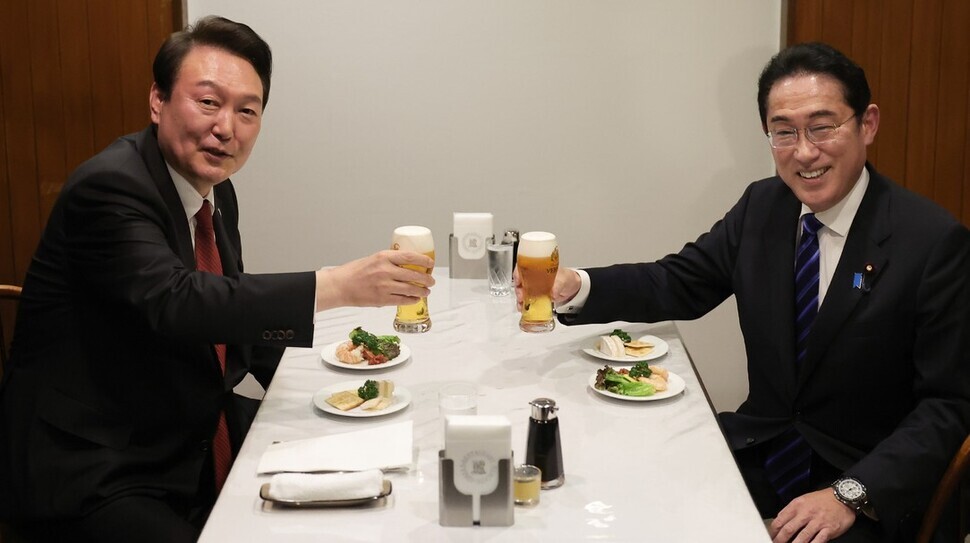hankyoreh
Links to other country sites 다른 나라 사이트 링크
Yoon’s foreign policy comes under fire after Japan forgoes good faith gesture

South Korean President Yoon Suk-yeol faces sharpening criticism over his foreign policy toward Japan after Tokyo approved social studies textbooks for elementary school students that downplay the compulsory nature of forced labor during its colonial rule of Korea and make a stronger territorial claim to the island of Dokdo.
Yoon has already been savagely criticized for the sweeping concessions he made during a recent summit with the Japanese prime minister, and some see Tokyo’s latest historical distortions as amounting to a slap in the face.
The spokesperson of Korea’s Ministry of Foreign Affairs expressed regret in a statement Tuesday, remarking that “the Japanese government needs to be more responsible about educating the future generation as it squarely faces up to history.”
But critics say the Yoon administration’s hasty move to pardon Japan for past offenses on the assumption that Tokyo would act in good faith may leave it with little room to issue a strong rebuke over the textbook issue.
Nam Ki-jeong, a professor at the Institute for Japanese Studies at Seoul National University, said that Seoul’s decision to cover the damages due to victims of forced labor through “third-party repayment” amounted to “acceptance of Japan’s argument that the compulsory mobilization of Koreans during the colonial period was not compulsory or illegal but rather routine labor mobilization.”
That leaves Seoul “unable to criticize Japan even if it denies the ‘compulsory nature’” of that labor,” Nam said.
Japanese Prime Minister Fumio Kishida described Korean victims of forced labor as “former civilian workers from the Korean Peninsula” in a joint press conference held following his summit with Yoon on March 16.
Nam also commented on the Dokdo issue. “Japan made a territorial claim to Dokdo last December while revising three security documents, including the National Security Strategy, which stipulates acquiring ‘enemy base strike capability’ [counterstrike capability]. Nevertheless, Yoon stressed the threat of North Korea’s nuclear weapons and missiles during the summit with Japan on March 16 and said he ‘understands Japan’s position’ in regard to the revised security documents.”
Some experts say the Yoon administration’s rush to improve relations with Japan without adequately addressing past issues will leave it on the hook for smoothing over future conflict in the two countries’ relations.
“The government rushed to announce a solution to the forced labor issue in an attempt to improve Korea-Japan relations. But if the implementation of that solution is blocked by domestic opposition, there will be ferocious pushback from Japan that could have devastating consequences for their relationship,” said Choi Hee-sik, a professor of Japanese studies at Kookmin University. “The government needs to push the Japanese to refrain from behavior that could rub Koreans the wrong way, but it seems to have gotten off on the wrong foot.”
Korea’s majority opposition Democratic Party placed the blame on the Yoon administration’s foreign policy toward Japan.
“Is this the future-oriented relationship with Japan that Yoon has been touting? If he has a tongue, he ought to speak up about Japan’s audacious behavior,” said Park Sung-joon, spokesperson for the Democratic Party.
The ruling People Power Party has been scrambling to spin the textbook development.
“I would say the problem is that Japan hasn’t overcome a militaristic mode of thinking, and not that something went wrong with the Korea-Japan summit. There doesn’t seem to be any causal link between the two,” floor leader Joo Ho-young said.
By Jung In-hwan, staff reporter; Seo Young-ji, staff reporter; Lim Jae-woo, staff reporter
Please direct questions or comments to [english@hani.co.kr]

Editorial・opinion
![[Editorial] Penalties for airing allegations against Korea’s first lady endanger free press [Editorial] Penalties for airing allegations against Korea’s first lady endanger free press](https://flexible.img.hani.co.kr/flexible/normal/500/300/imgdb/original/2024/0502/1817146398095106.jpg) [Editorial] Penalties for airing allegations against Korea’s first lady endanger free press
[Editorial] Penalties for airing allegations against Korea’s first lady endanger free press![[Editorial] Yoon must halt procurement of SM-3 interceptor missiles [Editorial] Yoon must halt procurement of SM-3 interceptor missiles](https://flexible.img.hani.co.kr/flexible/normal/500/300/imgdb/child/2024/0501/17145495551605_1717145495195344.jpg) [Editorial] Yoon must halt procurement of SM-3 interceptor missiles
[Editorial] Yoon must halt procurement of SM-3 interceptor missiles- [Guest essay] Maybe Korea’s rapid population decline is an opportunity, not a crisis
- [Column] Can Yoon steer diplomacy with Russia, China back on track?
- [Column] Season 2 of special prosecutor probe may be coming to Korea soon
- [Column] Park Geun-hye déjà vu in Yoon Suk-yeol
- [Editorial] New weight of N. Korea’s nuclear threats makes dialogue all the more urgent
- [Guest essay] The real reason Korea’s new right wants to dub Rhee a founding father
- [Column] ‘Choson’: Is it time we start referring to N. Korea in its own terms?
- [Editorial] Japan’s rewriting of history with Korea has gone too far
Most viewed articles
- 160% of young Koreans see no need to have kids after marriage
- 2Months and months of overdue wages are pushing migrant workers in Korea into debt
- 3[Editorial] Penalties for airing allegations against Korea’s first lady endanger free press
- 4Bills for Itaewon crush inquiry, special counsel probe into Marine’s death pass National Assembly
- 5[Reporter’s notebook] In Min’s world, she’s the artist — and NewJeans is her art
- 6[Guest essay] Maybe Korea’s rapid population decline is an opportunity, not a crisis
- 71 in 3 S. Korean security experts support nuclear armament, CSIS finds
- 8S. Korea discusses participation in defense development with AUKUS alliance
- 9Cracks found in containment building of UAE nuclear power plant built by S. Korean companies
- 10Trump asks why US would defend Korea, hints at hiking Seoul’s defense cost burden